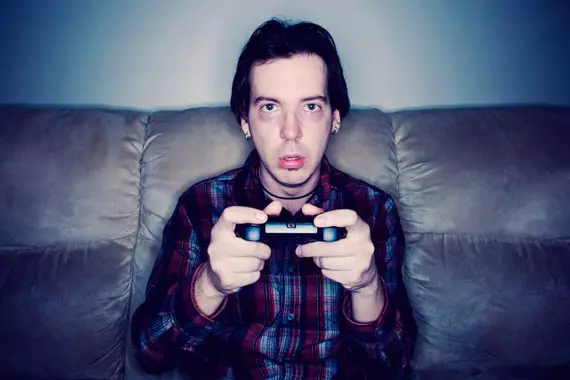A study, published in Nature, May 11, 2022, seems to claim playing video games makes kids smart. The study looked at 9,855 children from the USA who took part in the ABCD study – a long-term study of brain development and health of children in the United States, aged 9-10, following them over two years. The study also looked at the effect of gaming alongside watching activities (TV, YouTube, Twitch, etc) and social activities (e.g. TikTok, Facebook, etc) on children’s intelligence, controlling for other factors affecting intelligence including socioeconomic status.
The team found, following up with the children two years later, that those who spent longer than average playing computer games had increased their IQ points by around 2.5 points above the average for their age group.
When the other types of screen time activities were looked at – children who used social media and watched content more than the average – there wasn’t an effect on intelligence, positively or negatively.
Study name : The impact of digital media on children’s intelligence while controlling for genetic differences in cognition and socioeconomic background
Study authors: Bruno Sauce, Magnus Liebherr, Nicholas Judd & Torkel Klingberg
After the Press Release, The Peer Analysis:
I asked Gregory West, a Psychology Professor at the Université de Montréal to interpret the study’s findings. West is well known for his recent studies with Pr. Véronique Bohbot of Mc Gill on the impact of different types of video gaming on the development of different brain areas.
- The study looked at children 9 to 10 that did limited gaming to show video games makes kids smart. Apparently around one hour a day. Where gaming can have detrimental effects on the brain is when, due to the addictive nature of some games, playing occurs for hours on end.
- The increase in the children’s IQ the team brings up is 2.5 points, which is statisticallly significant but not a major difference in intelligence.
Could all Video Gaming not have Equal Consequences ?

- More importantly, the team does not differentiate the impact on IQ based on what types of video games were played. If, in the available American sample from the ABCD study, children played mostly age-appropriate games, then that would be very different from a case where children played first shooter games. These are not recommended under 13 at a minimum by the industry itself but are too often played from age 10 today.
West knows what he’s talking about when asking about the type of video game played. In a study published in August 2017, Gregory West and Véronique Bohbot, an associate professor of psychiatry at McGill University, found that first shooter video games played by young adults over four years causes some users to lose grey matter in a part of their brain associated with the memory of past events and experiences, the hippocampus.
After 90 hours of playing first-person shooter games such as Call of Duty, Killzone, Medal of Honour and Borderlands 2, the brain scans of response learners showed what West said is “statistically significant” grey matter loss in the hippocampus.
Relying on response learning means leaving in your brain in “autopilot” mode, West explained, instead of exercising the hippocampus by using your more conscious memory system.
“The problem is, the more they use the caudate nucleus, the less they use the hippocampus, and as a result the hippocampus loses cells and atrophies,” adding that this could have “major implications” later in life.
The brain scan of a habitual first-shooter video-game player shows the hippocampus to be smaller in a ‘statistically significant manner,’ according to West and Bohbot. (submitted by Gregory West)
The hippocampus is a well-understood biomarker for certain neuropsychiatric diseases, West explained. “People with reduced grey matter in the hippocampus are more at risk for developing post-traumatic stress disorder and depression when they’re younger and even Alzheimer’s disease when they’re older,” he said.
Playing 3D Platform Games like SuperMario 64 Increased the Hippocampus in Brains, Study Finds
On the other hand, all participants playing 3D platform games, such as Super Mario 64, showed growth in the hippocampus after the experiment. 3D platform games require players to navigate in a virtual environment by remembering previously visited locations.
This result, West said, suggests that 3D platform games could be used as a kind of antidote to the negative effect of action games on hippocampal grey matter in response learners. “It’s certainly possible that someone could pick up a 3D platform game and train their brain to grow that grey matter back,” he said.

Hence the importance of being more specific about the type of gaming done in the newly released study, versus speaking generically about video gaming and its impact on IQ. In the same way, consuming food will make us thinner if its healthy versus fatter if its unhealthy.
Is Being Smart The Only Desirable Outcome from Video Gaming ?
- On another note, the researchers themselves recognize: “We didn’t examine the effects of screen behaviour on physical activity, sleep, wellbeing or school performance, so we can’t say anything about that,” says Torkel Klingberg, professor of cognitive neuroscience at the Department of Neuroscience, Karolinska Institutet.

The Karolinska Institutet is the leading medical university in Sweden, and the funder of the study conducted by researchers in neuroscience Nicholas Judd & Torkel Klingberg, alongside Bruno Sauce in Amsterdam and Marcus Liebherr in Germany.
So if 9 to 10 year olds had an IQ higher by 2.5 points after two years of playing some sorts of video games, we dont know from this research what video games they played, have no idea of the effect of time spent gaming per day, nor how empathetic, healthy or happy they felt.
Sources:
- The study published in Nature May 2022:
Sauce, B., Liebherr, M., Judd, N. et al. The impact of digital media on children’s intelligence while controlling for genetic differences in cognition and socioeconomic background. Sci Rep 12, 7720 (2022). https://doi.org/10.1038/s41598-022-11341-2 - The study by V.Bohbot and G.West published in Nature in August 2017: Impact of Certain Video Games on the Plasticity of the Hippocampus.







